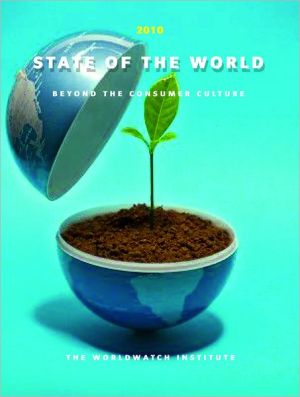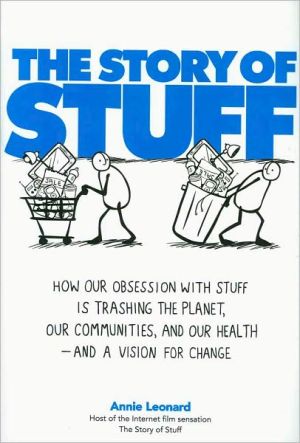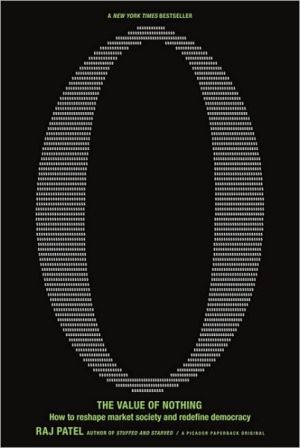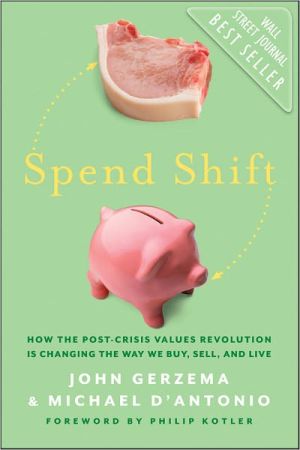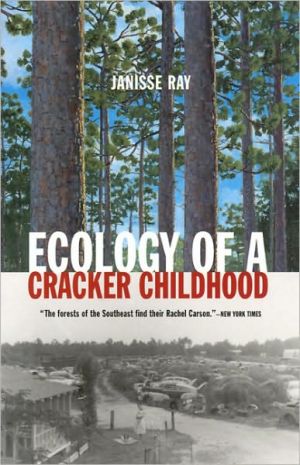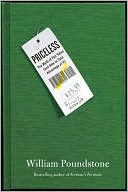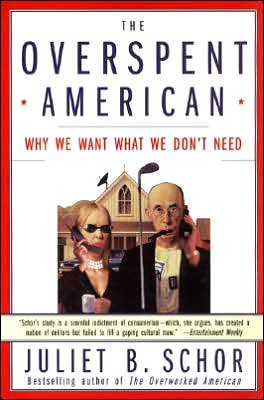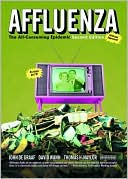State of the World 2010: Transforming Cultures: From Consumerism to Sustainability
The premier environmental nonprofit shows the ways to transform our consumer culture into a culture centered on sustainability.\ For society to thrive long into the future, we must move beyond our unsustainable consumer culture to one that respects environmental realities. In State of the World 2010, the Worldwatch Institute’s award-winning research team reveals not only how human societies can make this shift but also how people around the world have already started to nurture a new culture...
Search in google:
The premier environmental nonprofit shows the ways to transform our consumer culture into a culture centered on sustainability. Publishers Weekly In this year's volume, the D.C.-based Worldwatch Institute think-tank considers, in several dozen pieces, how "cultures of consumption" can be transformed into "cultures of sustainability." Many ideas take inspiration from diverse traditions: religions can be called upon to embrace their own deepest values and renounce materialism, while establishing new holidays, rituals and taboos incorporating strategies for sustainability (Earth Day, "Green funerals," new days of fasting, etc.); practices honoring elders as transmitters of ancient wisdom can be spread beyond regions where they still thrive (Africa, India, etc.); thousand-year-old Asian farming methods can be revived. Ideas for restructuring education include replacing the "Three Rs" with the "Seven Rs" ("reduce, reuse, recycle, respect, reflect, repair, and responsibility") and emphasizing "environmental education" in higher learning. The largest-scale changes include shifting societal goals from "maximizing growth of the market economy to maximizing sustainable human well being"; ensuring that the burden of reduced production falls on the wealthiest, not the poorest; and building sustainable cities like Vauban, a 5,000-household German community that uses 100 percent renewable energy. Though many solutions in this visionary volume require a pie-in-the-sky "whole Earth community" legal system prioritizing "the right to life" over "the right to conduct business," it should give leaders and laypeople much to consider. Copyright © Reed Business Information, a division of Reed Elsevier Inc. All rights reserved.
Acknowledgments viiForeword Muhammad Yunus xvPreface Christopher Flavin xviiState of the World: A Year in Review Lisa Mastny Valentina Agostinelli xxiThe Rise and Fall of Consumer Cultures Erik Assadourian 3Traditions Old and New 21Engaging Religions to Shape Worldviews Gary Gardner 23Ritual and Taboo as Ecological Guardians Gary Gardner 30Environmentally Sustainable Childbearing Robert Engelman 36Elders: A Cultural Resource for Promoting Sustainable Development Judi Aubel 41From Agriculture to Permaculture Albert Bates Toby Hemenway 47Education's New Assignment: Sustainability 55Early Childhood Education to Transform Cultures for Sustainability Ingrid Pramling Samuelsson Yoshie Kaga 57Commercialism in Children's Lives Susan Linn 62Rethinking School Food: The Power of the Public Plate Kevin Morgan Roberta Sonnino 69What Is Higher Education for Now? David W. Orr 75Business and Economy: Management Priorities 83Adapting Institutions for Life in a Full World Robert Costanza Joshua Farley Ida Kubiszewski 85Sustainable Work Schedules for All Juliet Schor 91Changing Business Cultures from Within Ray Anderson Mona Amodeo Jim Hartzfeld 96Social Entrepreneurs: Innovating Toward Sustainability Johanna Mair Kate Ganly 103Relocalizing Business Michael H. Shuman 110Government's Role in Design 117Editing Out Unsustainable Behavior Michael Maniates 119Broadening the Understanding of Security Michael Renner 127Building the Cities of the Future Peter Newman 133Reinventing Health Care: From Panacea to Hygeia Walter Bortz 138Earth Jurisprudence: From Colonization to Participation Cormac Cullinan143Media: Broadcasting Sustainability 149From Selling Soap to Selling Sustainability: Social Marketing Jonah Sachs Susan Finkelpearl 151Media Literacy, Citizenship, and Sustainability Robin Andersen Pamela Miller 157Music: Using Education and Entertainment to Motivate Change Amy Han 164The Power of Social Movements 171Reducing Work Time as a Path to Sustainability John de Graaf 173Inspiring People to See That Less Is More Cecile Andrews Wanda Urbanska 178Ecovillages and the Transformation of Values Jonathan Dawson 185Notes 191Index 231Boxes1 Do High Consumption Levels Improve Human Well-being? Erik Assadourian 92 The Essential Role of Cultural Pioneers Erik Assadourian 193 A Global Ecological Ethic Patrick Curry 284 Deepening Perceptions of Time Alexander Rose 345 Dietary Norms That Heal People and the Planet Erik Assadourian Eddie Kasner 496 Sustainability and the Human-Nature Relationship Almut Beringer 587 Toy Libraries Lucie Ozanne Julie Ozanne 668 Transformation of the California Academy of Sciences Gregory C. Farrington 689 Unresolved Questions in Environmental Education David C. Orr 7710 Maximizing the Value of Professional Schools Erik Assadourian 7811 A New Focus for Scientists: How Cultures Change Paul R. Ehrlich Anne H. Ehrlich 8112 The Folly of Infinite Growth on a Finite Planet Øystein Dahle 8713 Upgrading the Corporate Charter Kevin Green Erik Assadourian 10214 Cradle to Cradle: Adapting Production to Nature's Model William McDonough Michael Braungart 10615 A Carbon Index for the Financial Market Eduardo Athayde 10816 The U.N. Marrakech Process on Sustainable Consumption and Production Stefanie Bowles 12017 Making Social Welfare Programs Sustainable Kevin Green Erik Assadourian 14118 Principles of Earth Jurisprudence Cormac Cullinan 14419 The Evolving Role of Environmental Journalism in India Raj Chengappa 16220 Lights, Camera, Ecological Consciousness Yann Arthus-Bertrand 16521 Art for Earth's Sake Satish Kumar 16622 Growing a Degrowth Movement Serge Latouche 18123 The Slow Food Movement Helens Gallis 182Tables1 Sustainable World Population at Different Consumption Levels 62 How Industries Have Shifted Cultural Norms 143 Media Access by Global Income Group, 2006 154 Reference Works on Religion and Nature 245 Selected Religious Perspectives on Consumption 266 Economic Precepts of Selected Religious and Spiritual Traditions 297 Childhood Marketing Efforts from Around the World 648 Examples and Features of Choice Editing 1229 Health Care Performance, Selected Countries, 2006 13910 Selected Successful Product and Social Marketing Campaigns 15311 Efforts to Promote Media Literacy, Selected Countries 160Figures1 Humanity's Ecological Footprint, 1961-2005 52 Aspirations of First-Year College Students in the United States, 1971-2008 103 U.S. Gross Domestic Product versus Genuine Progress Indicator, 1950-2004 884 Annual Hours of Work in Selected Countries, 2007 925 Culture Change Model 98
\ GlobeScanTop-ranked annual books on sustainable development.\ \ \ \ \ Publishers WeeklyIn this year's volume, the D.C.-based Worldwatch Institute think-tank considers, in several dozen pieces, how "cultures of consumption" can be transformed into "cultures of sustainability." Many ideas take inspiration from diverse traditions: religions can be called upon to embrace their own deepest values and renounce materialism, while establishing new holidays, rituals and taboos incorporating strategies for sustainability (Earth Day, "Green funerals," new days of fasting, etc.); practices honoring elders as transmitters of ancient wisdom can be spread beyond regions where they still thrive (Africa, India, etc.); thousand-year-old Asian farming methods can be revived. Ideas for restructuring education include replacing the "Three Rs" with the "Seven Rs" ("reduce, reuse, recycle, respect, reflect, repair, and responsibility") and emphasizing "environmental education" in higher learning. The largest-scale changes include shifting societal goals from "maximizing growth of the market economy to maximizing sustainable human well being"; ensuring that the burden of reduced production falls on the wealthiest, not the poorest; and building sustainable cities like Vauban, a 5,000-household German community that uses 100 percent renewable energy. Though many solutions in this visionary volume require a pie-in-the-sky "whole Earth community" legal system prioritizing "the right to life" over "the right to conduct business," it should give leaders and laypeople much to consider. \ Copyright © Reed Business Information, a division of Reed Elsevier Inc. All rights reserved.\ \
